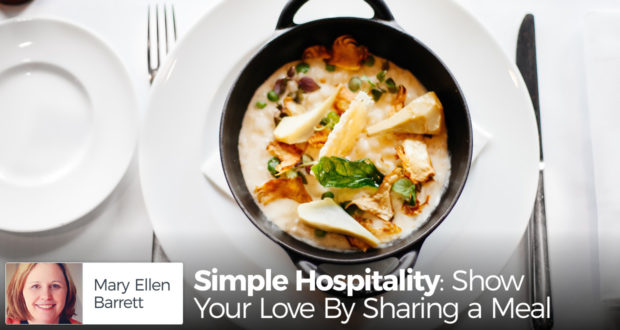I think it’s really important for us, as parents, to model hospitality for our children—to open our homes to people, for celebrating, relaxing, nurturing and commiserating.
Practicing hospitality is something that often gives anxiety to homeschool moms since many of us don’t live in houses that are being featured in Better Homes and Gardens.
Believe me, they aren’t ringing me up begging for a photo shoot either. Chances are, the people you would be most comfortable entertaining are not expecting an HGTV perfect home. They are hoping to relax and enjoy your company.
It’s important in these times that are so very trying, to surround ourselves with people we love, and when we gather together, food just happens. The desire to feed, to nourish, is instinctive in us; it’s evidence of our longing to provide, to comfort, to connect. When all else fails, food is the language of love.
It is why, when we lost our son, we received a dinner meal each night for months. When words are inadequate, food can speak for you. It can say “I’m sorry. I love you,” or in the event of a new baby it says “Congratulations! I’m so happy for you.” Food speaks, and when it does, everyone listens.
It is one of my greatest pleasures to have people in my home. When we were searching for our home, our real estate agent, the most patient and kindest of men, was fully informed, ad nauseam, of my desire for a living area that I could fill with people.
Friends needed to be able to sit with a plate and a glass of wine and enjoy each other’s company. We found a house with a large yard and a large living room, and everything else immersed in the seventies (think harvest gold shag and lots of shiny wallpaper), but it didn’t matter because we hosted some people about two weeks later and everyone had a plate and a glass. That’s all you need.
My favorite method of entertaining is chili and cornbread after five o’clock Mass on Sunday evening. My daughter often sings at that Mass, and it just feels right to invite people back for crockpot chili and a pan of cornbread. Ask someone to bring a salad, someone else a dessert, provide a decent bottle of wine and some beer, and you have the perfect casual dinner party. We relax and let the graces of the sacrament just received bless the gathering.
In the summer I will often call friends and ask what they are planning to cook for dinner. Then I invite them to come cook it at my house. People arrive with their burgers and chicken, salad fixings and husks of corn. We cook together, the kids play in the pool or on the zipline, we pray, and we feast. It’s easy, it’s casual, and it’s fun.
A quick tidy-up of the house beforehand is all that is needed. A clean bathroom, some fresh flowers from the backyard, good food, and no one will know if there are dust bunnies under the couch. If people find dust bunnies, offer them a broom.
From the very beginning food has played a role: that darned apple, unleavened bread, a lamb slaughtered for the Passover, manna, water to wine. God knows our need for the language of food. For the comfort of the actions of preparing—kneading, mixing simmering—and the grace that happens in the gathering.
The very pinnacle of our worship began at a humble supper, bread and wine blessed and shared amongst those who loved our Lord.
The gathering matters, too. Our Lord knew that, and He wants us to gather not only at Mass but in our homes, in the homes of our friends, in parks and in restaurants, in dining halls and gymnasiums. There is spiritual significance in sharing a meal.
When the world seems harsh and we as Christians feel unloved and misunderstood, we should gather. Call your friends, call your family. Roll some meatballs, fire up the grill, roast a chicken, uncork the bottle and gather.
Ask God’s blessing and relax; it will feed more than your stomach.

 Seton Magazine Catholic Homeschool Articles, Advice & Resources
Seton Magazine Catholic Homeschool Articles, Advice & Resources
